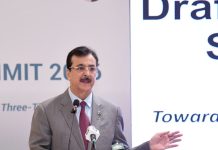By Hina Kiyani
ISLAMABAD: The Sustainable Development Policy Institute (SDPI) hosted the inaugural steering committee meeting of the National Network of Economic Think-Tanks (NNETT) in a collaborative effort to bridge the gap between academia, industry, and policymakers.
NNETT, the network, initiated in 2018, seeks to unite think-tanks, civil society, and academia under one platform. Representing a geographically and sectorally inclusive body, members from Punjab, Sindh, Balochistan, and Khyber Pakhtunkhwa.
Dr. Abid Qaiyum Suleri, facilitator of NNETT, emphasized the importance of an impartial and solution-oriented approach. “Think-tanks must remain objective and bridge the gap between research and actionable solutions,” he remarked, noting Pakistan’s improved macroeconomic indicators but stressing the need for comprehensive reforms.
Secretariat of the NNETT’s mission is to promote policy research and effective communication strategies. The network has already published 15 policy papers, with as many underway, and held 40 public-private dialogues. The group has also conducted workshops and province-wide economic reporting sessions to turn policy recommendations into actionable frameworks.
“We aim to develop NNETT as a national advisory body, expanding its influence both locally and globally,” Engr. Ahad Nazir stated, emphasizing its success in advocating for initiatives like the Strategic Trade Policy Framework and Power Wheeling Policy.
The speakers highlighted systemic barriers hindering progress, including financial constraints in academia, weak industry-academia linkages, and the lack of grassroots research.
Zafar Masud, President of the Bank of Punjab, highlighted the critical need for stronger collaboration between academia, think-tanks, and industry in Pakistan, drawing comparisons from international model. He emphasized the untapped potential in the environmental sector, calling it a major opportunity for the business community. “The integration of technology and capacity building for farmers is essential to modernize agricultural practices,” he said.
Masud also pointed to the persistent challenge of access to financing, urging stakeholders to explore global best practices to address the issue. “We need to crack this riddle and find innovative solutions to enable progress,” he added.
Dr. Khalid Hafeez, Vice-Chancellor of Balochistan University of Information Technology, Engineering and Management Sciences (NNETT), stressed the need for data-driven policies to address Balochistan’s challenges, including climate change and the water-food-energy nexus.
“We are pioneering data intelligence programs and working on initiatives like olive oil production and smart disaster risk management labs,” said Dr. Hafeez. He envisions Zhob, Balochistan, becoming the country’s next food basket, given its untapped potential in organic farming.
Quratulain, CEO of AiN Consulting, stressed the need for greater coordination between departments to guide eco-entrepreneurship efforts. “The youth have potential but lack direction,” she said.
Dr. Safdar Rehman, the Acting Vice Chancellor of Bannu University, addressed critical issues related to the region’s agricultural potential and water resources. He added that while Bannu has an abundance of water, the quality of rice production remains a significant challenge that requires urgent attention and improvement. He also pointed out that the soil in Bannu is particularly well-suited for the cultivation of turmeric, an opportunity that could be explored further to enhance the local agricultural sector.
Additionally, he highlighted the untapped potential of vast tracts of land stretching from Karak to DI Khan and from Mianwali to Muzaffargarh, much of which remains barren. According to Dr. Rehman, transforming these lands into productive agricultural areas could greatly contribute to Pakistan’s national economy. He called for focused research projects aimed at bringing these underutilized lands into cultivation, thereby boosting agricultural productivity and economic growth in the region.
Zafarullah Khan from CIPE advocated for inclusive and transparent policymaking, calling for district-level economic research and the revival of colonial-era economic planning frameworks. “Public-private partnerships are critical to unlocking innovation and driving economic growth,” he asserted.
NNETT’s ambitious agenda includes forming thematic working groups, enhancing policy advocacy, and monitoring outcomes. With a coalition of stakeholders driving impactful projects, NNETT is poised to redefine economic policy discourse in Pakistan, fostering sustainable and inclusive growth.





